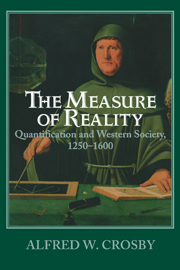
-
Select format
-
- Publisher:
- Cambridge University Press
- Publication date:
- October 2013
- November 1996
- ISBN:
- 9781107050518
- 9780521554275
- 9780521639903
- Dimensions:
- (228 x 152 mm)
- Weight & Pages:
- 0.56kg, 262 Pages
- Dimensions:
- (228 x 152 mm)
- Weight & Pages:
- 0.38kg, 262 Pages
You may already have access via personal or institutional login
Book description
Western Europeans were among the first, if not the first, to invent mechanical clocks, geometrically precise maps, double-entry bookkeeping, precise algebraic and musical notations, and perspective painting. By the sixteenth century more people were thinking quantitatively in western Europe than in any other part of the world. The Measure of Reality, first published in 1997, discusses the epochal shift from qualitative to quantitative perception in Western Europe during the late Middle Ages and Renaissance. This shift made modern science, technology, business practice and bureaucracy possible.
Reviews
‘In this thoroughly fascinating monograph, Alfred W. Crosby asks a fundamental question: How and why did it come to pass that Europeans, seemingly backward bumpkins in medieval times, became so successful as imperialists?’
John Allen Paulos Source: LA Times
‘The Measure of Reality has all the intellectual scope, vivid detail, imaginative interpretation and delicious wit that I expected from Crosby’s earlier books. Here Crosby argues that Western Europeans were better imperialists than any humans before them in part because, from the thirteenth century onward, they thought about reality in quantitative terms and did so more consistently than other peoples. There is an important lesson here for today.’
Joel E. Cohen - Rockerfeller University
‘Crosby shows us how Europeans prepared for their world encompassing expansion after 1500 by learning how to measure, calculate and control the world around them by breaking reality into equal, arbitrary units. The Measure of Reality is a brilliant, provocative essay, as original and persuasive as his earlier Ecological Imperialism. A really significant little essay, full of new information and delightfully written as well.’
William H. McNeill
‘Western Europe did remake itself during that thousand years in a way that no other culture in the world did - or even attempted to do. And that is the transformation addressed in a very accessible and readable way by Crosby’s stimulating, wide-ranging study of the intellectual development of the medieval West.’
Richard Holt Source: The New York Times Book Review
Contents
Metrics
Altmetric attention score
Full text views
Full text views help Loading metrics...
Loading metrics...
* Views captured on Cambridge Core between #date#. This data will be updated every 24 hours.
Usage data cannot currently be displayed.
Accessibility standard: Unknown
Why this information is here
This section outlines the accessibility features of this content - including support for screen readers, full keyboard navigation and high-contrast display options. This may not be relevant for you.
Accessibility Information
Accessibility compliance for the PDF of this book is currently unknown and may be updated in the future.


